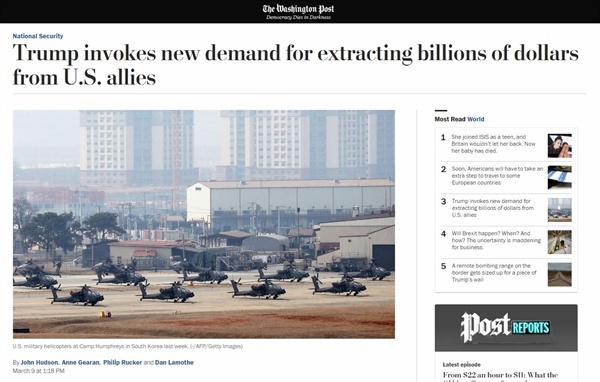 |
|
The Washington Post published an article on Trump’s “cost plus 50” demand for stationing US troops overseas. (Washington Post website)
|
US president invokes new demand of additional 50% from allies, Washington Post reports
Some expect US President Donald Trump to apply his “cost plus 50” formula to the US’ negotiations with South Korea for next year’s defense cost-sharing agreement. According to this formula, a country hosting US troops would have to pay the complete cost for stationing those troops along with an extra 50%. Although South Korea and the US officially updated their cost-sharing deal, known as the Special Measures Agreement, on Mar. 8, the latest deal is only good for one year. As a result, the two countries will have to return to the negotiating table this year to either extend or revise their current deal. In a Mar. 9 article titled “Trump invokes new demand for extracting billions of dollars from US allies,” the Washington Post said that Trump has a plan to ask major allies to cover the cost of stationing overseas US troops plus 50% and that South Korea might have to face this demand in its negotiations for next year’s cost-sharing arrangement. The newspaper reported that this plan came up in a private discussion between Trump and his advisors. This year, South Korea has agreed to pay US$925 million toward the cost of stationing US troops on the peninsula, an increase of 8.2% from the previous year. The newspaper estimated that this share amounted to about half of the total cost. Setting aside the question of how that total cost is calculated, the application of the “cost plus 50” formula might mean that the amount of money that the Trump administration would request from South Korea next year could triple, to US$2.78 billion. The newspaper reported that a lot of ideas had been floated in regard to cost-sharing and that the “cost plus 50” formula might be a tactic to extract concessions from allied countries. A senior official in the US administration described this as not so much an official policy as an upper limit on the cost designed to make allies focus on Trump’s demands for them to shoulder a greater share of the burden. The newspaper also cited experts who had doubts about the formula. Stephen Walt, a professor of international relations at Harvard University, said that it’s fine to want one’s allies to take on more responsibility but that asking them to pay for their defense is the wrong approach. US troops aren’t mercenaries, Walt pointed out. Emma Ashford, a research fellow at the Cato Institute, said that the solution to the uneven commitment of rich allies is gradually shifting the burden to them by removing US troops, rather than continuing to station US troops there and asking those countries to foot the bill. Even if Trump signs onto this plan, the newspaper predicted, it won’t be rolled out as a sweeping demand for all allied countries. The newspaper noted that many of Trump’s senior aides are opposed to the formula and that they’ve convinced him to walk back extreme strategies in the past. By Yoo Kang-moon, senior staff writer Please direct comments or questions to [english@hani.co.kr]






